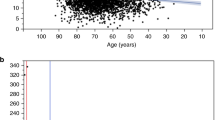Abstract
Individuals with a deficiency in the enzyme dihydropyrimidine dehydrogenase (DPD) may experience severe life-threatening toxicity when treated with 5-fluorouracil (5-FU). As routine measurement of enzyme activity is not practical in many clinical centres, we have investigated the use of DNA mutation analysis to identify cancer patients with low enzyme levels. We have identified two new mutations at codons 534 and 543 in the DPD cDNA of a patient with low enzyme activity and screened the DNA from 75 colorectal cancer patients for these mutations and the previously reported splice site mutation (Vreken et al, 1996; Wei et al, 1996). In all cases, DPD enzyme activity was also measured. The splice site mutation was detected in a patient (1 out of 72) with low enzyme activity whereas mutations at codons 534 (2 out of 75) and 543 (11 out of 23) were not associated with low enzyme activity. These studies highlight the need to combine DPD genotype and phenotype analysis to identify mutations that result in reduced enzyme activity.
Similar content being viewed by others
Author information
Authors and Affiliations
Rights and permissions
About this article
Cite this article
Ridge, S., Sludden, J., Wei, X. et al. Dihydropyrimidine dehydrogenase pharmacogenetics in patients with colorectal cancer. Br J Cancer 77, 497–500 (1998). https://doi.org/10.1038/bjc.1998.79
Issue Date:
DOI: https://doi.org/10.1038/bjc.1998.79
- Springer Nature Limited
This article is cited by
-
DPYD*6 plays an important role in fluoropyrimidine toxicity in addition to DPYD*2A and c.2846A>T: a comprehensive analysis in 1254 patients
The Pharmacogenomics Journal (2019)
-
Determination of 5-fluorouracil and dihydrofluorouracil levels by using a liquid chromatography–tandem mass spectrometry method for evaluation of dihydropyrimidine dehydrogenase enzyme activity
Cancer Chemotherapy and Pharmacology (2011)
-
Influence of pharmacogenetic variability on the pharmacokinetics and toxicity of the aurora kinase inhibitor danusertib
Investigational New Drugs (2011)
-
Pharmacogenetics of telatinib, a VEGFR-2 and VEGFR-3 tyrosine kinase inhibitor, used in patients with solid tumors
Investigational New Drugs (2011)
-
Genetic variations and haplotype structures of the DPYD gene encoding dihydropyrimidine dehydrogenase in Japanese and their ethnic differences
Journal of Human Genetics (2007)



